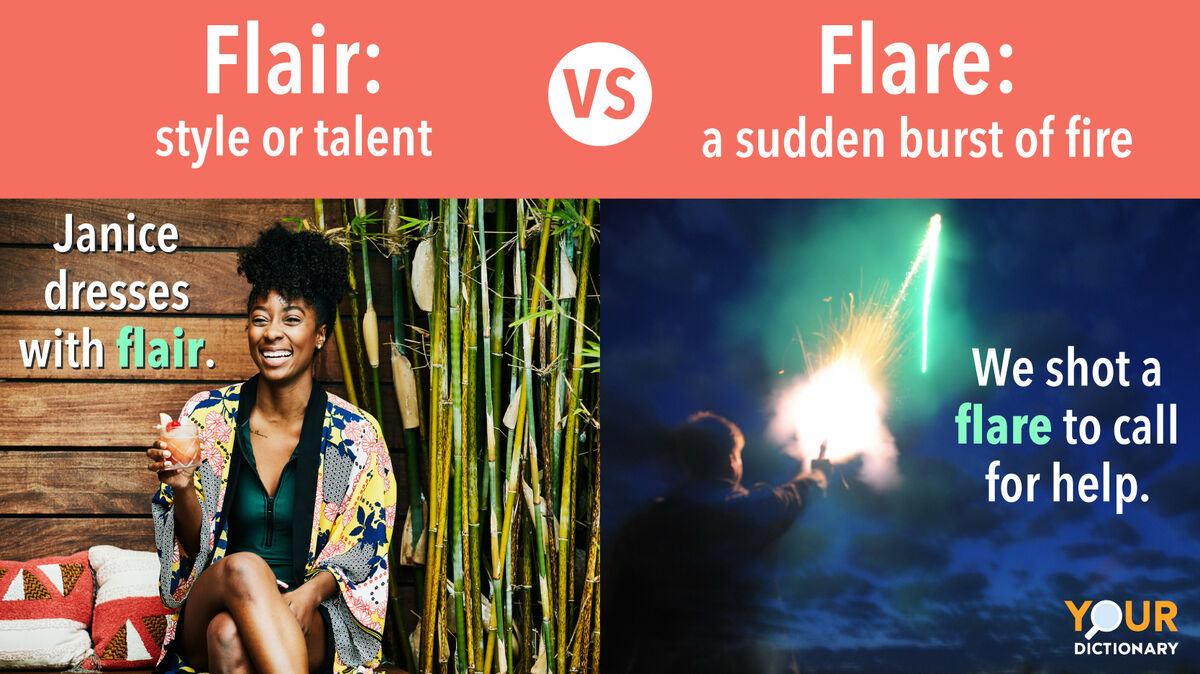
Do you write with flair or with flare? These commonly confused words may sound the same, but their meanings are quite different. So which is which? Avoid an easy grammar error with a helpful guide to flair vs. flare.
Telling Flair and Flare Apart
It's easy to mistake flair for flare, and vice versa. But their meanings and parts of speech are quite different.
- flair (noun) - style, talent or ability
- flare (noun or verb) - having to do with fire or something that widens
As you can see, choosing the incorrect word could cause your readers some confusion. "My house is full of flair" means that your house has lots of style, while "My house is full of flare" might mean that your house is burning down (although that would be a strange way of putting it).
Flair Means Style or Talent
Flair functions as a noun that describes a person's special ability, talent or style. Because flair can refer to any type of talent, it's usually followed by the preposition for and the talent it's describing. You can also use it on its own ("My sister signs her name with flair" means that she signs her name with style).
How to Use Flair as the Object of a Sentence
The most common usage of flair is as the direct object to the linking verb have. For example:
- You really have a flair for decorating.
- Lisa has a flair for telling jokes.
- The pastry chef has a flair for rich and creamy frosting.
How to Use Flair as the Subject of a Sentence
You can also use flair as the subject of a sentence when it's performing the action. For example:
- Your flair for decorating really shows in your apartment.
- Lisa's flair for telling jokes had everyone laughing.
- The pastry chef's flair for frosting made the cake rich and creamy.
How to Correctly Use Flare
Unlike flair, the word flare refers to several different meanings, all of which have to do with a sudden change. For example, when you say "Mark's temper flared," you're indicating that Mark suddenly became angry. The definitions of flare include a sudden burst of fire, a rapid onset of disease or pain, or a shape that widens at the end.
Flare Meaning: A Burst of Fire or Light
Flare often refers to a sudden burst of fire or light. For example, the phrase flare gun describes a pistol designed to send a fiery flare into the sky as a signal of distress.
You can use flare as a noun or a verb in this context. For example:
- The wildfire flared in the strong dry wind.
- Adding lighter fluid made the barbeque flames flare wildly.
- When the ships saw the flare burst in the distance, they immediately set out for a rescue mission.
Flare Meaning: The Widening of a Shape
If you've ever owned flared jeans, you know that flare can indicate a shape that is straight on one side and bell-shaped on the other. This sudden widening can be a noun, a verb or even an adjective (as in "flared jeans"). For example:
- Some jeans have a large flare at the bottom, which makes them look like a bell.
- The straight trombone flares into a circular horn at the end
- His nostrils flared as he became angrier and angrier.
Flare Up Meaning: A Rapid Onset of Pain or Disease
If you've heard of someone having a flare up of a disease, they're describing a quick worsening of their condition. A person with arthritis may have a flare up of pain in their joints, while a patient with chronic lung issues may experience coughing as a flare up of their condition.
Like flare, you can use flare up as a noun or a verb. For example:
- Jose's hacking cough told us that he was having a pneumonia flare up again.
- My grandma's arthritis flares up when the weather changes.
- Whenever my knee injury flares up, I have to rest it.
How To Choose the Right Word
So how do you pick the right word in your writing? Use some quick tips for telling the difference between flair and flare.
- If you're giving someone a compliment, use flair. Both flair and compliment have an "i."
- If you're talking about fire, use flare. Both fire and flare have an "e."
- Flair looks like fairy. Fairies certainly have some flair!
- Flare looks like blare. Trumpets blare through their flared horns.
Never Say Flaire
Some writers get so confused between flair and flare that they resort to flaire, which is not a word at all. While you might see it as a cute shop name or a fun style app, it's not the correct replacement for flair or flare.
The basic rule is: use flair when talking about style, use flare in every other situation, and never use flaire at all.
Showcase Your Flair For Writing
Your unique voice and perspective already make you a worthwhile writer. Once you clear up common grammar errors such as flair vs. flare, you'll really be able to show off your flair for writing! Learn more about commonly confused word pairs with a short lesson on fair vs. fare.